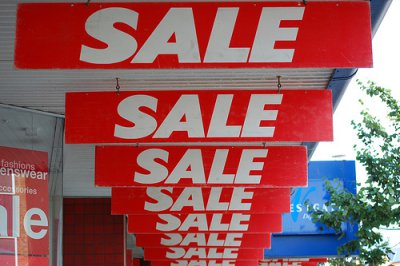Ban business use of "Up to" and "From"
By Value hunter on May 8, 2011 | In In real life, Money chat, Bad business, Quango watch, Rip off Britain
In the history of retail and marketing, never has two simple phrases done so much damage to the consumer.
The two phrases/words are:
"Up to" and "From"
The removal of these, would do more to help the consumer overnight, than any amount of the spurious pap put out by trading standards, consumer direct and consumer focus (how many millions of pounds spending quangos do we need to regulate the same things?)
The use of the asterix (*) should also be banned instantly!
It cannot be right that the individual can see an advertised price on point of sale material, displayed by a shop/store/website and cannot purchase the product advertised for that price!
The total price an individual pays for a product or service MUST be the price advertised, without exception.
The holiday/flight "Sale" price:
Back in January 2011, a well known travel operator was advertising that a holiday to San francisco was in their "20% off" sale.
The advertised price was "From £580"
In the last week of January 2011, an email came through stating that it was beneficial to frugal ways, to advertise that there was to be "An extra 10% off January sale prices for the last week of the sale" yet the price of the same San francisco holiday was now "From £630"
How can that be allowed? What are trading standards doing about this blatent misleading of customers?
It is now common practice, to advertise the price of flights, for which the amount you see is rarely if ever charged. The marketing prices from is for the first 10 seats on the plane, after that they increase in price dramatically. The travel agents blame the airlines, the airlines blame the travel agents. The customer loses out.
Many online sales of flights don't even bother to add the "Up to" or "From" anymore!
I rang up in January 2011, for flights advertised at prices ranging between £399 and £480 - for a planned holiday in August 2011.
Not a single flight I enquired about would have cost me less than £700 - how can this be allowed?
I got nothing but excuses from the businesses and website owners;
"It's the summer holidays for schools"
"It's our peak time!"
"Everybody wants flights in August"
"The price advertised doesn't include taxes"
"The headline price was available only for flights in January" (Even when it did not state this on the website)
High street stores:
The wonders of ordering white goods through a well known catalogue firm!
We needed a new dryer, the price was the same at a number of high street companies (how convenient) but when it came to picking the goods up, it was a very different story.
£320 was the price advertised, so I asked which store would it be best to pick one up from?
"You can't, it has to be delivered!" was the reply.
In the small print, on page god knows what, was a disclaimer saying that the price did not include delivery charges. (£25 back then)
So where can I purchase this product for the £320 that you are advertising it for?
"Online or at any of our stores, it will be ordered and delivered within 5 working days" the assistant stated.
So I cannot purchase the product for the price advertised?
"Yes, but there will be a delivery charge of £25 to pay"
This makes the minimum price I can pay to have this product from your company £345 and NOT the £320 you are advertising it as!
"No, the price is £320"
No, the minimum price HAS to include your compulsary delivery charge of £25!
Clear misrepresentation at the point of sale, regardless of any small print in the back of their catalogue!
How many times have you been into a shop/store, with huge "Sale" cards splattered in the window and around the store, only to find that the "Sale" is limited to a few things shoved on a rack or shelf?
Then we have the headline sale advertising "From" when in fact the item or service cannot be purchased for the headline amount?
Other business/marketing scams include raising the prices by considerable amounts for 28 days, sometimes less than this (even though it's illegal!) and then screaming about the huge "Sale" they have, despite the customer paying the same prices as they would have, if the products had not been increased in price beforehand.
Some stores only increase the price of goods/services at one of their stores, so that they don't take the hit of customers not buying at over inflated prices, in the run up to an imaginary "sale"
What are trading standards doing about it?
Nothing, is the simple answer.
Customers are getting kicked from pillar to post by businesses up and down the land, online, in catalogues and on the high street.
Seldom do they even return calls or land on companies and enforce consumer laws on the requirements to have a certain amount of products available at the advertised prices, or forcing companies to change their headline prices when the few available at them are no longer.
Customers are people of Britain - we demand that the millions of pounds we give to trading standards and other quangos in this area (consumer direct?), be put to good use and carry out the job they were brought in to do, PROTECT PEOPLE from bad business practices and stretching of UK consumer laws!
No feedback yet
| « Dad diary - Cat's tails, escapology and an £85 Million pound lottery win? | The road to being frugal - day trips out » |












